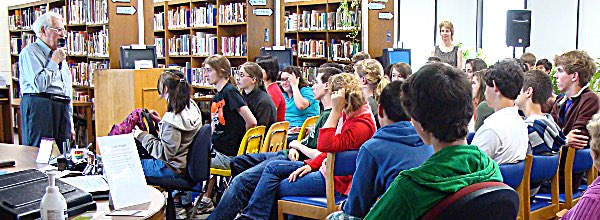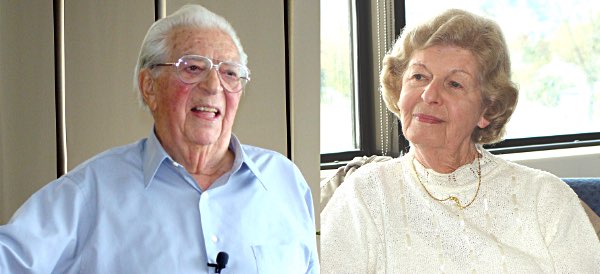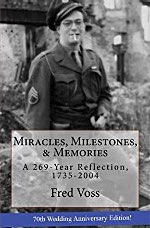- By Fred Voss
- Around Town
 Print
Print  Fred Voss at Lansing High School in 2011
Fred Voss at Lansing High School in 2011| Eighty years ago today the Nazis destroyed more than 1,000 Jewish synagogues and over 7,500 Jewish businesses were destroyed, and 30,000 Jewish men were arrested and taken to concentration camps. It was known as Kristallnacht, the 'night of broken glass'. In 1998 Fred Voss, a survivor of that infamous night, wrote this letter to his grandson. | ||
The absurdity of hate.
Last week you asked me a question. Your question was: How do I think the Holocaust will be remembered by future generations, after we survivors – like your grandmother and I – are no longer on this earth, and our eyewitness stories, especially the one about Kristall Nacht, can no longer be heard.
I have thought about your question and that leads me to write this letter to you.
One day, a student will read a history book, or he or she will enter the Holocaust Museum in Washington and wonder, Was it all true?
The student will wander through the exhibits at the museum and will ask: Were the victims that hopeless, that lonely, that abandoned, that rejected by most countries in this world?
How was it possible for an entire people, the Jewish people, to be chosen, to be singled out for humiliation and destruction?
I imagine the young student like yourself today, sitting in a classroom, or visiting the Holocaust Museum, of which your grandparents are charter members. How will the exhibits, the history books, the works of Elie Wiesel, the story of Anne Frank, affect that young student? The student may be moved by curiosity and do some research on their own. He or she may go to a library, which I hope will have volumes of books on the Holocaust, where the student can sit down and read and hopefully understand.
So what will the young student discover? He or she will discover that while the killer killed, and his victims perished, this beautiful land of ours enjoyed serenity. The student will discover that while six million Jews and untold millions of Christians were slaughtered, millions of other people at the same time enjoyed life at the fullest. The hotels must have been full, the beaches crowded, the entertainment in hotels and night clubs were probably as good or as bad as ever.
The student must wonder, how come? Didn't people know? Didn't people care? The answer to both is: yes. Most newspapers reported the events, and yet somehow, it made no difference.
Will the fact that it happened as the history books will tell make a difference? I really hope so, because if the student doesn't learn from history, how can he or she ever learn how to prevent another tragedy again?
I hope that future generations will ask questions, as they look at the pictures of the emaciated dead bodies lying in the streets, pictures of naked mothers shielding their little babies, pictures of a group of SS men enjoying themselves while they are tormenting an old man with a long white beard (looking like my own grandfather, may he rest in peace).
Hopefully people will look at those pictures which have been preserved and people will realize that there existed a suffering that was beyond suffering. During that era, these poor people used to say "It cannot get much worse." How wrong and how naive they were. The killer had a much greater imagination than their victims. What was worse than wearing the yellow star? The ghettos. What was worse than the ghettos? The train ride in the cattle cars. What was worse than the cattle cars? The camps.
 Fred and Ilse Voss, whose own family was driven from their home to live in a synagogue in Vienna until it was set on fire on Krisallnacht, at Lansing High School in 2012. Over many years Voss, now 99, told his story to hundreds of teenagers, who learned that their lives were quite different from Voss's when he was a teen in Germany during the Holocaust.
Fred and Ilse Voss, whose own family was driven from their home to live in a synagogue in Vienna until it was set on fire on Krisallnacht, at Lansing High School in 2012. Over many years Voss, now 99, told his story to hundreds of teenagers, who learned that their lives were quite different from Voss's when he was a teen in Germany during the Holocaust.On Kristallnacht Fred Voss's father was taken to Buchenwald, a notorious concentration camp. At 18 years old Fred eluded the Gestapo. His mother signed away all the family's belongings to obtain his father's release, and the family made a harrowing escape while visiting cousins who were taken away and never seen again. Fred eventually made his way to the US, where he joined the Army. More recently he told his story to hundreds of local teenagers to make sure that the next generation will not forget the horrors of the Holocaust, hoping that remembering will prevent it happening again. He told his family's story in 'Miracles,Milestones, and Memories'. | ||
There the people of the time reached the limits and there they would say: Do not look any further. Do not look at what was going on inside. What was going on inside the gas chambers ought to be a privileged affair – those men, women and children ought not to be shown, not even their skeletons.
They would tell us: What went on inside the gas chambers will remain things you will never, ever know. You can never imagine or understand, except if you were there, in the gas chamber with us.
There are things that we still cannot understand in 1998 and I am not referring to the past alone. Can anyone explain the anti-Semitism of today?
Can anyone explain the tragedies in Africa and the murders in Bosnia and in Rwanda? The repression in China, the bloodletting in the Sudan, the death tolls in Ireland, and in so many other places in the world – all still occurring in 1998?
Can anyone explain that there are people today, in 1998, who deny these tragedies? Where, one must ask, do they get the money to publish their books and their arrogance to voice their perverse ideas?
The Holocaust has become cheapened, commercialized and vulgarized. To many people the word "Holocaust" no longer means anything.
To remember means to feel compassion for the victims of all persecutions, it means for a Jew to claim a kinship with oppressed people everywhere in the world. It means that all decent people everywhere should and must oppose any more hatred in the world, any more anti-Semitism.
Elie Wiesel has said "We must always remember that while every Jew became a victim of the Holocaust, not all victims of the Holocaust were Jews."
The student will learn that the Holocaust could have been avoided, if the world's leader had only spoken up with courage and outrage. Had the churches demonstrated greater measures of compassion. Had Roosevelt and Churchill only agreed to bomb the railways leading to Auschwitz, Birkenau and other death camps, destroying them. Had the world shown only the heroic Warsaw ghetto fighters, who kept the Nazi army longer at bay than the French and British army did at Cherbourg.
The student will read Elie Wiesel's book "NIGHT" or the story of Anne Frank. He or she will read her famous quote, when she wrote that she still believed that "all men are good at heart." My question is, would she have known the truth about Eichmann, Himmler and the thousands who masterminded the death factories? Would she have believed that they were good at heart? When Anne Frank wrote those words in her diary, she was still young, and still believed in mankind, but that was before she entered Auschwitz and Bergen Belsen. Would she have written the same words afterwards, had she survived?
Elie Wiesel wrote "We Jews believe in God, but we also believe in humanity, in spite of what humanity has done to us."
We, the survivors, are obsessed with the Holocaust. I am personally obsessed with the names of the victims, like your great grandfather, your mother's grandfather, Ignatz Machauf, and your great-uncle, your grandmother's brother, Kurt Machauf, who was only twelve years old when he was arrested by the Gestapo and sent to the Lodz concentration camp and from there to another camp in Chelmo, Poland, where he was murdered.
All the names, from the very young to the very old. Sixty-seven members of both your grandmother's immediate family and my immediate family. They included my wife's four-year-old little cousin, and an 81-year-old sister of my grandfather whom they took away from a home for the aged, and sent her to a concentration camp in Czechoslovakia , called Theresienstadt, where she was killed two days after she arrived, because the Nazis had no use for her,
Our enemy tried to dehumanize us, the victims, but by doing what they did, they only dehumanized themselves.
The entrance sign at the Holocaust Memorial Museum in Washington, DC, reads "For the dead and for the living we must bear witness." These were the words Elie Wiesel spoke as he opened the museum on April 22, 1993. It was the day that America remembered those who had perished at the hands of the murderers and honored those brave American soldiers who participated in the liberation of the death camps.
At eight o'clock in the morning of the previous day, on April 21, 1993, under a raining sky, the United States Holocaust Memorial Council met at the Arlington National Cemetery to remember the soldiers who together liberated the over 1000 death camps in Europe – soldiers not only from the United States of America, but also military forces from the former Soviet Union, Canada, New Zealand, Great Britain, France – and the Jewish Brigade, which was a part of the British army. Both your grandmother and I were there, we were invited by the Museum to participate at the opening ceremony.
Historians have established that November 9th, 1938, sixty years ago this week, was the start of the final solution – not only in Germany and in Austria but for Jews all over Europe. The Nazi torturers were stronger than their victims.
We will always remember, even if we live as long as God lives, that infamous night when we cried out for help and the world kept quiet. We will always remember all the destruction during that night – the temples burning, the people who were killed mercilessly, the pious and the non-believers, the old and the young, the wealthy and the poor.
Tragically, we the survivors believed our friends' assurances that all would become better more than we believed our enemies' threats to kill us. Nights were spent waiting for dawn, days were spent waiting for dusk. We sat and stood behind our darkened windows, we were in mortal fear and terror. We believed that a miracle would happen.
There are those who could not have cared less that it happened and then there are those who deny that the Holocaust ever happened.
I wish that the deniers were right, but for the dead and the survivors we must forever bear witness.
Some time ago, I read a poem, the author is unknown to me, but it summons up my letter to you and answers your question.
And when our witness generation comes to an end When the time comes for us to round the last bend; We will know in our hearts, with our final sigh Those beloved six million of us never, ever will die
They reside with you, our children, and your children too They will reside in the hearts of every decent human too and in the heart of the last living Jew.
With all our love,
Your Grandparents
v14i43



